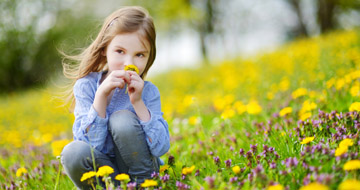Diagnosing allergies in children and babies
Allergies are becoming increasingly common, with the UK having one of the highest rates of allergy in the world. Latest figures show that 1 in 11 children have asthma, for example, more than 1 in 4 children have eczema and more than 1 in 3 children have symptoms of hay fever. If your child has recurrent symptoms such as sneezing, a runny or stuffed up nose, itchy skin, cough or wheezing, our paediatric allergist can help.
Children and allergies
Allergy develops when the immune system overreacts to substances which should normally be seen as harmless. These substances are known as allergens and common examples include pollen, dust mites, moulds and animal sheddings. Some foods can trigger allergies, too, especially nuts, eggs, milk, soya and wheat, but also unexpected foods such as avocado and kiwi fruit. As symptoms may not develop for a day or two after exposure to the allergen, it’s not always easy to pinpoint the culprit without specialist allergy testing.
Why some children develop allergies and others don’t is not fully understood. In some cases, allergies may run in families – a tendency known as ‘atopy’. In other cases, there is no obvious underlying reason. Some experts believe our modern indoor lifestyles are to blame, while others suggest our living conditions are simply too clean. Children aren’t exposed to the same level of germs which are thought to ‘teach’ their developing immune system to respond in the right way by fighting infections but ignoring harmless substances such as pollen. Yet another possibility is that lower intakes of fish oil or vitamin D are making our immune system too sensitive.
Babies and allergies
Babies with allergies display similar symptoms to older children with allergies, but will also seem fussy, uncomfortable and difficult to settle. They may keep sneezing, have a constant runny or stuffy nose, and keep scratching their skin or rubbing their eyes. Their skin may seem dry or develop obvious patches of eczema, and they may have loose nappies, colic or wind. Any problems with feeding, sleeping, or fussiness can result from an allergy, so if problems persist, it’s worth getting them checked.
What are the symptoms of allergies in children and babies?
Children and babies can react in unexpected ways to all types of substances and develop troublesome symptoms, such as:
Severe allergic reactions can cause an immediate reaction with facial swelling, difficulty breathing, low blood pressure and collapse (anaphylactic shock) which requires urgent medical treatment.
Although severe allergic reactions are, thankfully, less common, any allergy can make your baby or child feel miserable, interfere with their sleep and affect their ability to concentrate and learn.
Specialist allergy testing
If you think your baby or child could have an allergy, our paediatric allergist can help. Dr Sophie Flammarion specialises in allergy tests to identify exactly which substances or foods your child or baby is reacting against:
When you know what is triggering your child’s symptoms, reducing their exposure to those allergens can bring dramatic relief. Treatments include:
Children with severe allergies may need to carry an emergency treatment with them, such as an ‘Epi-Pen’ that can be administered at home or at school as soon as severe symptoms appear.
Visiting a Paediatric allergist at our Clinic in London
If you’re unsure whether or not your baby or child has an allergy, our general paediatricians can help. After a full assessment of your baby or child’s general health, they can refer you to our paediatric allergist if needed. The Medical Chambers Kensington, London is at hand to provide specialist paediatric allergy care. To find out more, please telephone 020 7244 4200 and we will be happy to answer your questions.










